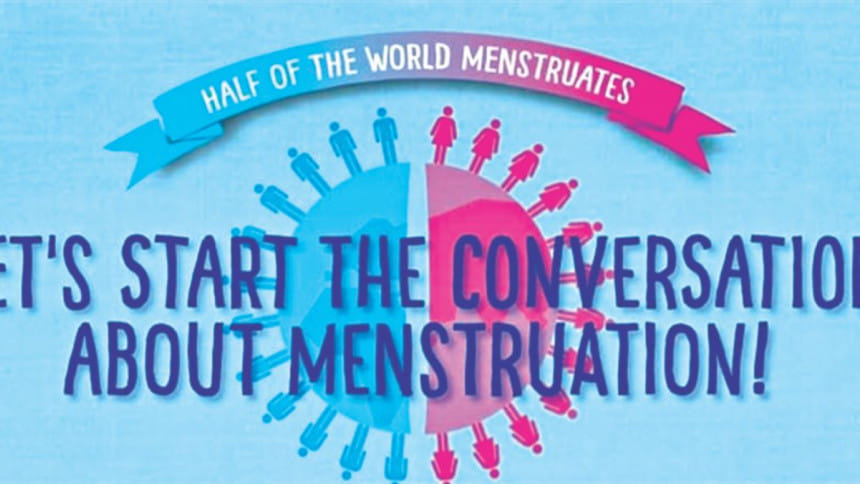MENSTRUATION HYGIENE MANAGEMENT

Menstruation is painful, socially awkward, quite expensive and most of the time very problematic to manage for the girls and women who experience them. According to the WHO-UNICEF Joint Monitoring System, when people in menstruation are able to use sanitary materials to absorb menstrual blood, change and dispose of these materials in privacy as needed, and have access to soap and water to keep clean is known as menstrual hygiene management (MHM). Thus, there is a two-fold challenge to ensure proper MHM for girls and women around the globe. Firstly, the ability to buy sanitary products, specially in countries where menstruation itself is a taboo and a tool to stigmatise young girls and as a result of which parents are not very likely to spend money over sanitary napkins and the girls are never vocal about it. Secondly, the lack of access to safe toilets with cleans water, soap and baskets where she can manage her menstruation with dignity and privacy. Already struggling with scarcity of sanitary products, girls are most likely to skip schools, colleges or universities during their menstrual cycle, directly affecting their right to education. This complex relationship between MHM and gender justice leads us to adress the issue whether MHM is necessarily a feminine concern.
Article 26 of the Universal Declaration of Human Rights (UDHR) dictates that everyone has a right to education and similar goals have been reiterated in the Constitution of Bangladesh as a Fundamental Principle of State Policy (FPSP). Article 19(3) of the Constitution of Bangladesh positively obliges the State to ensure equal opportunities and participation for women in every sphere of national life. Thus, when 41% of the school going girls in Bangladesh do not attend classes during their menstruation and 73% women miss their work for an average 6 days a month for infection caused by unhygienic menstrual management, can the State be held responsible for failing to address and remove the barriers to equal participation of women in education and work?
Article 19 of the Constitution of Bangladesh, which provides realisable safeguards against gender-based discrimination, reflects its reliance on the Article 2 of the UDHR which provides that everyone is entitled to their rights without discrimination based on distinctions like one's sex is reflected in. Thus, when a girl is deprived of her right to education and work solely due to a basic biological process which is not naturally controllable by her and is particular to her gender only, it results into gross violation of her constitutional right to equality as well as her basic human rights as guaranteed under the Constitution of Bangladesh and the international instruments on Human Rights.
While adjudicating the rights as mentioned above we are mainly faced with three challenges. Firstly, such right requires the State to provide services as opposed to traditional negative obligation. Secondly, it is beyond what was contemplated by the makers of the Constitution and thirdly that it raises questions as to the extent up to which the State can be held accountable in the backdrop of implementation challenges. Recently, a somewhat middle ground, positively balancing the above challenges was envisaged by the Delhi High Court. The Delhi High Court issued notice in a public interest litigation which acknowledged that the State has violated the right to education by failing to address barriers to education that are particular to a gender.
But such a right being necessarily a FPSP as per the Constitution of Bangladesh, can the apex court in Bangladesh hold the State responsible? The answer can be drawn from South African constitutional concept of “minimum core” under the ICESCR. It recognises a minimum core obligation on part of the State for realisation of social and economic rights and exempts the State only if it can demonstrate that “every effort has been made to use all resources that are at its disposition in an effort to satisfy, as a matter of priority, those minimum obligations.” Thus, it is high time the Bangladeshi courts determine and recognise whether MHM is a barrier in realisation of the right to equality and to live in dignity as women and in equal footing with their male counterparts and whether the right to MHM is necessary in realisation of the right to education as envisaged in the Constitution of Bangladesh as well as the international instruments on Human Rights. Such a step is undoubtedly required to be taken by the apex court which resulting into a concrete right of the citizens to positively bind the State.
The writer is a student of Law, University of Dhaka.

 For all latest news, follow The Daily Star's Google News channel.
For all latest news, follow The Daily Star's Google News channel. 








Comments